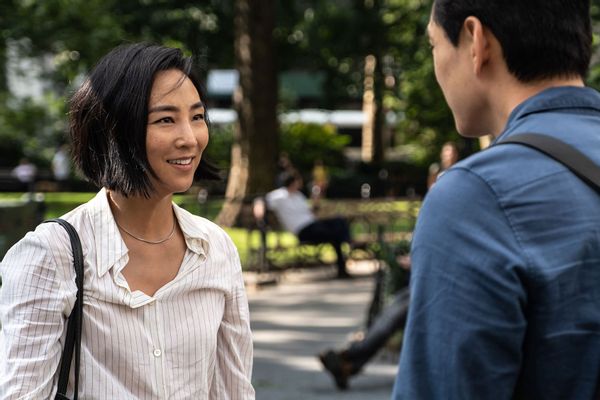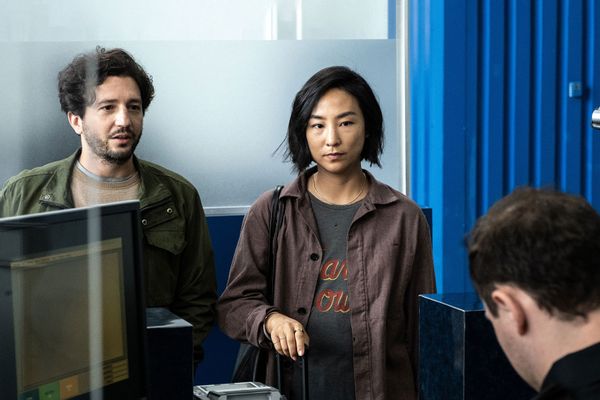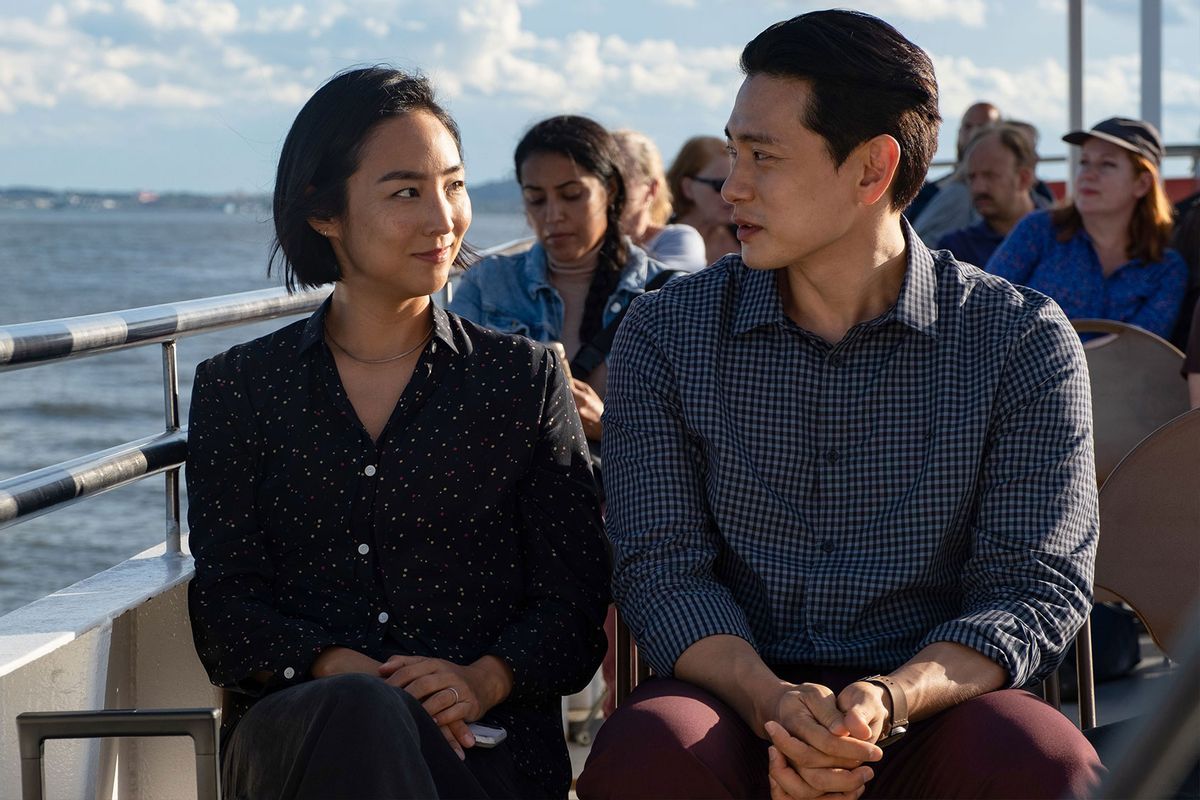When I ask her about her first love, my grandmother speaks wistfully about her chut sarang, a handsome law student at a neighboring university. "We would meet during breaks between our classes," she recalls. "We just sat and talked for hours."
"One never truly forgets their first love."
My aunt, who was so striking in her youth that celebrities asked her on dates, says she had her heart broken by a model who was her chut sarang. And when I probe my mother for details about her first love, she scoffs. "My chut sarang? I'm not telling you."
In "Past Lives," the debut feature from Korean Canadian American writer-director Celine Song, Nora (Greta Lee) explains the concept of inyeon to a fellow writer, Arthur (John Magaro), upon meeting him at an artists' residency. "There's a word in Korean. Inyeon. It means providence or fate. If two people get married, they say it's because there have been 8,000 layers of inyeon over 8,000 lifetimes."
Nora's chut sarang, Hae-sung (Teo Yoo), is a continent away in Seoul. After 11-year-old Nora immigrates from Korea to Canada, Hae-sung finds her on Facebook 12 years later.
"I missed you," Hae-sung says over Skype from Seoul, and she responds, "Me too. It doesn't make any sense."
Growing up, the idea of chut sarang was present in almost every Korean drama I watched. First loves occupy almost a mythological status in the Korean romantic imagination. "One never truly forgets their first love," is a common Korean adage I heard repeatedly.
Reuniting with a chut sarang is a well-loved trope in popular Korean films and dramas like "Our Beloved Summer," "Start Up" and "What's Wrong with Secretary Kim." In these stories, the younger leads are separated in childhood as life pulls them apart, only to reunite when they're older. For example, in "What's Wrong with Secretary Kim," the leads are kidnapped as children, and they both suppress the traumatic memory until they recognize each other in a work setting decades later.
Because romance viewers are always hungry for a happy ending, in many stories like "My First First Love," "My ID is Gangnam Beauty" and "My Sassy Girl," lovers overcome obstacles and disprove reality to stay together. Hallyu classic "My Sassy Girl" shows the leads meeting at a train station en route to their respective appointments. Their lives entangle as they skip those appointments, start to date and break up only to realize that the initial appointment they had both missed was a blind date where they would have been introduced to one another.
Inyeon as powerful as the one in "My Sassy Girl" was always what brought lovers back together. The pull of fate's threads were too magnetic to keep them apart.
 Past Lives (A24)Before watching "Past Lives," I expected another typical chut sarang storyline: Nora and Hae-sung reunite, and they end up together against all odds. But while certain elements of "Past Lives" did remind me of the K-dramas I'd seen, Song's incorporation of her personal story as a diasporic Korean filmmaker added another layer to the chut sarang trope.
Past Lives (A24)Before watching "Past Lives," I expected another typical chut sarang storyline: Nora and Hae-sung reunite, and they end up together against all odds. But while certain elements of "Past Lives" did remind me of the K-dramas I'd seen, Song's incorporation of her personal story as a diasporic Korean filmmaker added another layer to the chut sarang trope.
Nora eventually meets Hae-sung in person in New York City, but time, geography and experiences have created a divide too far to bridge. By this time, Nora has already married Arthur, the writer she met at the residency. She complains to him about Hae-sung, "He's so Korean . . . he has all these Korean views on everything, and I just feel really not Korean with him. I mean I have Korean friends, but he's like, not Korean American, you know? He's a Korean Korean."
I chuckled aloud at how much I related to her words: the subtle hints that arise in Nora and Hae-sung's conversation reveals the differences in their cultural values and perspectives. It's a dynamic that feels familiar to immigrants who reconnect with family and friends back in the motherland.
"What if you had never left? If you hadn't left like that, and we just grew up together, would I still have looked for you? Would we have dated? Broken up? Gotten married?" Hae-sung muses aloud. It's difficult to deny the allure of his question and not imagine an alternate life for Nora where she and Hae-sung might have been in love in Korea.
As a little girl in Seoul, I fully absorbed the myth of chut sarang from the K-dramas I watched with my aunt and my grandmother.
Not all K-dramas and films have satisfying endings for first loves. In some, like "Twenty-Five Twenty-One" and "Architecture 101," first love is thwarted by the realities that the main characters face, ultimately sending them on diverging paths.
It's also clear by the end of "Past Lives" that though Hae-sung is Nora's first love, Arthur may be Nora's fate. "In this life, you and Arthur . . . have the 8,000 layers of inyeon," Hae-sung tells Nora.
 Past Lives (A24)As a little girl in Seoul, I fully absorbed the myth of chut sarang from the K-dramas I watched with my aunt and my grandmother. I daydreamed about who my first love would be. The older Korean oppa from church? The debater from the all-boys prep school nearby? Or like the K-dramas and my aunt's stories, the handsome star who spotted me from across the street? I was taught by romantic films to believe that the only possible ending for me would be a happily ever after.
Past Lives (A24)As a little girl in Seoul, I fully absorbed the myth of chut sarang from the K-dramas I watched with my aunt and my grandmother. I daydreamed about who my first love would be. The older Korean oppa from church? The debater from the all-boys prep school nearby? Or like the K-dramas and my aunt's stories, the handsome star who spotted me from across the street? I was taught by romantic films to believe that the only possible ending for me would be a happily ever after.
But I later learned another common Korean saying about first loves: "Chut sarangs are never realized." If this is true, perhaps there's an irreplaceable beauty when first loves are left unfulfilled. If a chut sarang remains a first love and nothing more, it allows for the memory of youth to stay intact and pure, unsullied by the inevitable pain, heartbreak and grief felt in lived relationships.
To be clear: my grandmother, my aunt and my mother did not end up with their chut sarangs. The point of reminiscing about chut sarangs is that you rarely do.
"Don't you ever miss your first loves?" I ask all three women.
They cite fate as an excuse for moving on. "Everyone has their own inyeon," they cluck back.
In "Past Lives," Hae-sung represents more than just Nora's first love. By reuniting with him, she also reunites with the 11-year old girl she left behind in Korea many years ago. And, in saying goodbye, she bids both Hae-sung and her younger self from a past life farewell.
According to the women in my family, inyeon explains the life you are actually living, while chut sarang represents a fond nostalgia for the past. Both chut sarang and inyeon, then, may be the stories we tell ourselves in order to embrace the lives we lead, both past and present.



Shares